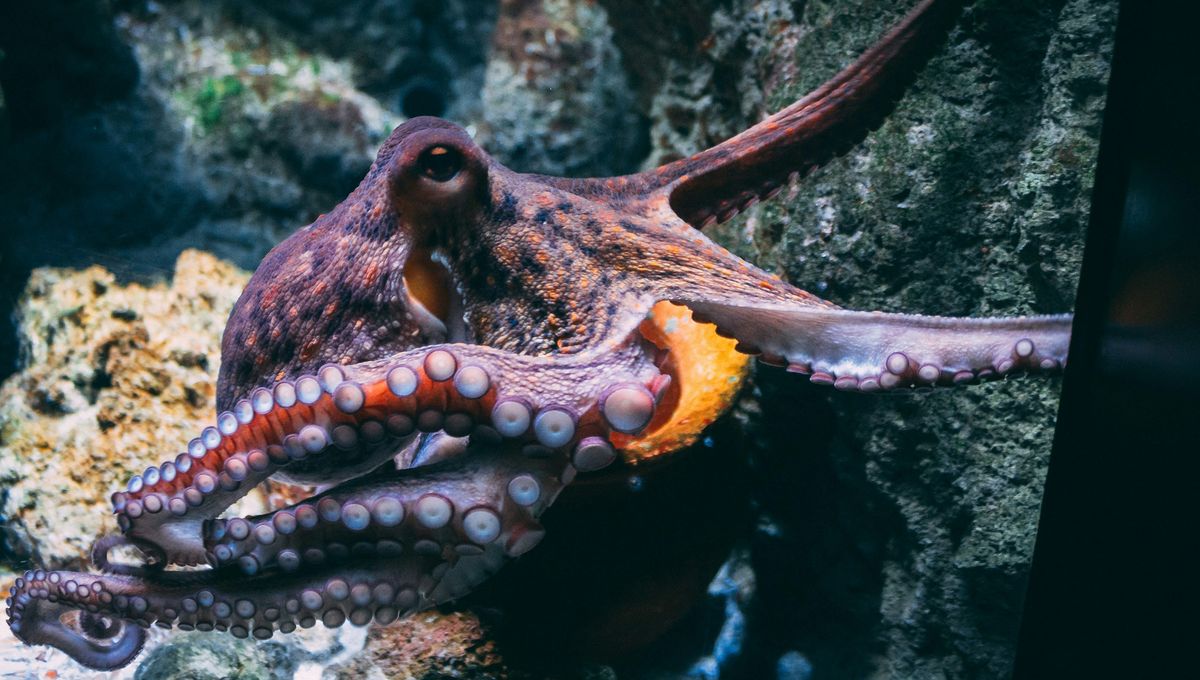
After solving some of the scientific hurdles associated with commercial octopus aquaculture, a Spanish seafood company has set their sights on building the world’s first octopus farm. However, the plan is meeting waves and waves of resistance from animal rights groups that argue it will be a disaster for animal welfare.
Nueva Pescanova plans to build a 52,691 square meter (around 567,000 square foot) building complex dedicated to octopus farming along the dock of Las Palmas in the Canary Islands, a Spanish archipelago in the Atlantic Ocean.
The two-story building will deal with every step of the octopus aquaculture process, from birth and death to packaging and shipping. Larvae will be birthed and initially fed on a diet of seaweed. In the next stage, a development process that lasts from six to 15 months, the juvenile octopus will be fed crabs. Eventually, they will be placed in communal tanks where they complete their development, before being slaughtered, frozen, packaged, and shipped off.
The farm has the potential hopes to produce around 3,000 tons of octopus each year, amounting to the slaughter of around one million animals.
Practically speaking, commercial octopus farming on an industrial scale is riddled with difficulties. There are numerous challenges in managing their reproduction cycle, keeping hatchlings alive, and providing the animals with a suitable living environment.
With hopes of pioneering this lucrative field, Nueva Pescanova has been working with scientists to iron out these problems. In 2018, their researchers managed to birth dozens of common octopus (Octopus vulgaris), the species most consumed in Spain. Remarkably, the offspring had a survival rate of approximately 50 percent. In the wild, this species has a survival rate as low as 0.0001 percent.
While demand for their meat is rising, consumers are also becoming increasingly conscious that octopuses are highly intelligent creatures, capable of advanced problem-solving and feeling pain. Some scientists are even speculating whether they are conscious beings; just because they’re invertebrates doesn’t mean they are any less cognizant.
This growing public awareness of cephalopod intelligence is, in no small part, thanks to the documentary My Octopus Teacher, which tells the story of a filmmaker forging a relationship with a wild common octopus. With the help of brilliant cinematography, the award-winning film provides a new, eye-opening perspective on these strange creatures.
Their evident intelligence raises questions about whether it is ethically appropriate to exploit these animals for industrial-scale farming. Since 2019, numerous NGOs have expressed their deep concerns about the prospect of octopus farming becoming a new trend in the global food market.
In October 2023, a collective of animal welfare groups and environmental NGOs – including Compassion in World Farming, Eurogroup for Animals, Greenpeace Spain, and Oceana UK – sent a joint letter to the Canary Islands government urging them to rethink the planning application from Nueva Pescanova.
They called on the government to cancel the plan on the grounds of unsustainability and animal cruelty. Furthermore, they argue that the current method of slaughter being chosen for the octopuses is inhumane and will result in millions of slow, painful deaths.
“It is important to stress that octopuses are wild animals profoundly unsuited to farming, and there are serious sustainability and animal welfare problems associated with this industry’s development,” the letter read.
“As naturally solitary animals, octopuses would not fare well in the group conditions and high stocking densities typical of farming systems. These intelligent animals could not express their natural behaviours, confined in barren underwater tanks.”
“Most importantly, there is currently no scientifically validated method for the humane slaughter of octopuses. According to reliable sources, Nueva Pescanova is planning to kill octopuses by submerging them in tanks containing water with ice, a method scientifically recognized for resulting in a painful, stressful, and slow death,” it adds.
Source Link: Plan For World's First Octopus Farm Continues To Cook Up Controversy